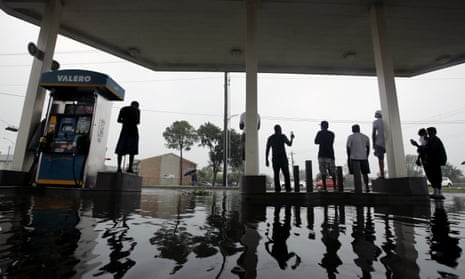US gasoline prices have increased to a two-year high as crude oil refineries along the Texas Gulf coast shuttered in the wake of Hurricane Harvey.
Prices at the pump are expected to rise after gasoline futures – the wholesale prices charged to gas stations – increased 5% early Monday, to their highest prices since July 2015.
The Gulf of Mexico accounts for nearly 20% of total US crude oil production, and the Texas Gulf coast is home to nearly a third of US refining capacity, according to the department of energy’s energy information administration.
Phil Flynnof thePrice Futures Group said another reason for the spike in gasoline prices is the Houston shipping channel remains closed. He said: “Even if some refineries come back online, they can’t move product. This drove [gasoline] futures to a two-year high and diesel prices spiked as well. Gas shortage fears are driving retail prices.”
The spike in prices is not expected to filter through to consumers for a week and may not last too long. Gas prices have risen sharply following past storms but returned to normal within two to four weeks, according to analysts Pira Energy.
But the scale of the latest disaster is still only taking shape. Gus Faucher, senior vice-chief economist of PNC, said it was still too early to assess the impact of the disaster on the US economy. “The potential for a larger economic impact is there,” he said. “Houston metro area is the fourth largest in the country and a lot of its industries, oil production and shipping, are tied to the wider economy.”
The impact of other recent disaster such as Hurricane Sandy in 2012 and Hurricane Katrina in 2005 were felt most in the areas they made land. Houston’s economic importance could make this storm most costly, said Faucher, but with the waters still rising it was too early to assess the full extent of the damage.
As of Sunday, Goldman Sachs energy analysts estimated nearly 3m barrels a day of refinery capacity was offline, representing 16.5% of the total US capacity. Additionally, about one million barrels a day of crude-oil production is now offline, representing 11% of the US’s current 9.3m barrels a day of current production. Three percent of US natural gas production is down because of the storm.
The majority of the refineries shut are in the Corpus Christi area, which were closed before Harvey’s hit. Houston refineries began to shut on Sunday; Goldman said it was possible the refinery outage figures could rise further.
The Eagle Ford shale-oil region – which sits on 3bn barrels of oil reserves – was in the direct path of Harvey, although further inland. Eagle Ford oil production is currently around 1.34m barrels a day, according to Platts Analytics’ Bentek Energy. As a precaution before the storm, offshore US Gulf operators closed 378,633 barrels a day of production, or 21% of total crude-oil output and 26% of natural gas production, said according to a US Bureau of Safety and Environmental Enforcement survey Sunday.
“Historically, onshore production has rebounded faster than offshore production and this would be consistent with producer commentary that loss of production is due to preventive shut-ins for now,” Goldman Sachs said.
With major ports in Houston and Corpus Christi closed to vessel traffic, S&P Global Platts said imports and exports of crude and refined products will be delayed. So far there are no reported oil spills or damages to storage tanks in Corpus Christi area ports.
The effects will be felt beyond just Texas, S&P Global Platts said. “Texas is also a major source of refined products to the Northeast via Colonial Pipeline, and waterborne refined products and crude exports. US Gulf coast refiners exported 2.7 million b/d of refined products in May, primarily to buyers in Latin America and Europe. US Gulf coast refiners regularly export gasoline to Mexico, for instance, and diesel to Europe.”
